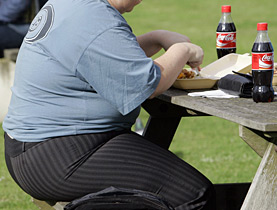Insurer weighs up introducing “fat” premiums

The life insurance arm of Zurich Financial Services says it is studying introducing policies that would link premiums to bodyweight – a first in Switzerland.
An organisation representing the obese has criticised any attempt to link premiums to body mass index (BMI), saying this would constitute discrimination.
“We are a bit concerned about the fact that again, obese people are discriminated against,” Heinrich von Grünigen, head of the Swiss obesity foundation, told swissinfo. He insisted that a customer’s BMI should not be reflected in his or her premium.
The Federal Health Office also expressed unease at the idea of linking premiums to BMI. “Solidarity applies between the healthy and the sick. There should be no differences in premium,” said the Health Office’s Daniel Dauwalder.
Speaking to swissinfo on Thursday, the insurance giant denied Zurich Life Switzerland had concrete plans to introduce the controversial premium. It followed a report in the Swiss financial newspaper Handelszeitung that the move was imminent.
“We have been differentiating smokers from non-smokers,” Zurich Life Switzerland CEO Ivo Furrer told the Handelszeitung. “Now we are studying whether classifying by body mass index is worth considering.”
Common practice
Zurich Life says that it is not the only company in Switzerland considering the idea, and that the practice of linking charges to BMI is common in other European countries. Firms routinely differentiate based on age, gender and lifestyle habits, the insurer says, and in cases of extreme obesity, there is often a surcharge levied.
It said that its study – which is based on internal research and modelling – is a response to customer preferences. Customers had expressed an interest in being rewarded for lifestyle decisions, and a person’s BMI was controllable.
“It makes sense that the actions of our health-conscious customers are reflected in their premiums,” a spokeswoman told swissinfo.
A survey by the industry association Santésuisse recently indicated that two-thirds of customers were in favour of linking lower rates to better health. Zurich Life said that any plan would only involve lowering – not raising – rates.
Von Grünigen says keeping track of “yo-yoing” bodyweight would be a bureaucratic nightmare, and that in any case, there is little that people can do about being obese.
Fattening of the land?
His organisation estimates that two-thirds of people are predisposed to being overweight, a problem that has been exascerbated by the modern sedentary lifestyle.
But he believes that the overconsumption of food should not be equated with a tobacco or alcohol addiction.
“Nobody needs to smoke. Nobody needs to drink alcohol. You can stop smoking and you can stop drinking. But you cannot stop eating,” he said.
The Swiss obesity foundation says that roughly 40 per cent of the Swiss population is fat, and predicts the number to rise to over 50 per cent in the next several years.
swissinfo, Justin Häne
BMI provides a measure of a person’s “fatness” or “thinness”, allowing health professionals to discuss weight problems with their patients.
For people with an average body composition, a BMI of 18.5-25 may indicate optimal weight. A BMI above 25 may indicate a person is overweight, while a BMI above 30 suggests the person is obese and over 40 morbidly obese.
BMI is controversial because it is often used for medical diagnosis, when it was actually meant to classify people’s average body composition.
The Swiss obesity foundation says that an insurance company using a BMI test would be unable to distinguish between a bodybuilder and an obese person of similar weight.
The fifth national report on nutrition published in 2005 found that 37% of the Swiss population were overweight.
Nearly one in five youngsters, aged 15 to 25, eats fast food at least twice a week.
Diseases and health problems related to weight cost an estimated SFr2.7 billion ($2.5 billion) every year in Switzerland.
The number of obese children has increased five-fold since 1980, with one in five children overweight.

In compliance with the JTI standards
More: SWI swissinfo.ch certified by the Journalism Trust Initiative












You can find an overview of ongoing debates with our journalists here . Please join us!
If you want to start a conversation about a topic raised in this article or want to report factual errors, email us at english@swissinfo.ch.